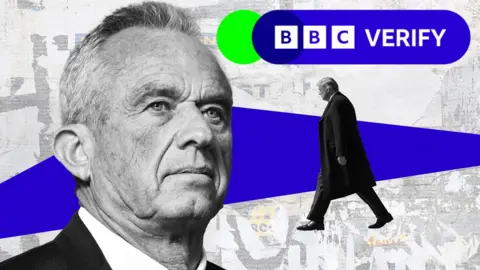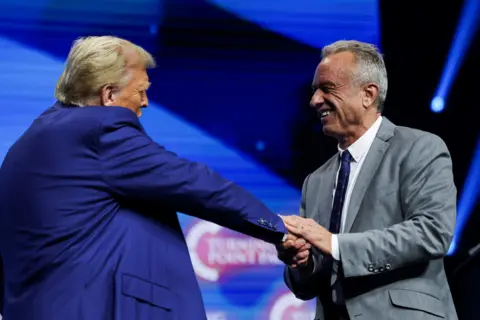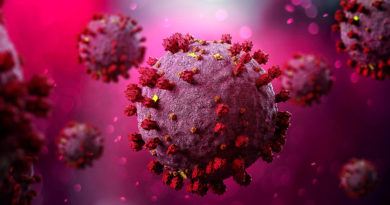RFK Jr: Fact-checking his views on health policy
 BBC
BBCRobert F Kennedy Jr has been nominated by Donald Trump to be the next US health secretary, a post that oversees everything from medical research to food safety and public welfare programmes.
Speaking in an NPR interview this week, Kennedy said Trump had given him three “instructions”: to remove “corruption” from health agencies, to return these bodies to “evidence-based science and medicine”, and “to end the chronic disease epidemic”.
Some of Kennedy’s own stated aims for government are bound up with misinformation – and many medical experts have expressed serious concerns about his nomination, citing his views on vaccines and other health matters.
On other matters he has more support, for example in scrutinising the processing of food and the use of additives.
What does RFK Jr say about vaccine safety?
Kennedy said in his NPR interview that vaccines were “not going to be taken away from anybody”.
He says he wants to improve the science on vaccine safety which he believes has “huge deficits” and that he wants good information so people “can make informed choices“.
But his critique of the vaccine safety regime has been roundly dismissed by experts.
While Kennedy has denied on several occasions that he is anti-vaccination and said he and his children are vaccinated, he has repeatedly stated widely debunked claims about vaccine harm.
One of his main false claims – repeated in a 2023 interview with Fox News, was that “autism comes from vaccines”.
This theory was popularised by discredited UK doctor Andrew Wakefield.
But Wakefield’s 1998 study was later retracted by the Lancet medical journal. Multiple studies since, across many countries, have concluded there is no link between vaccines and autism.
Dr David Elliman, a consultant in community child health at Great Ormond Street Hospital in London, said RFK Jr has perpetuated myths around vaccination with “an utter disregard for the evidence”.
“If he is appointed and continues in the same mode, I fear not just for the vaccination programme in the US, but similar programmes around the world, and for healthcare in general,” says Dr Elliman.
“Vaccination has probably saved more lives and is better researched than most, if not all, aspects of healthcare. RFK Jr could set this back and be responsible for the death and disability of myriads of people, particularly children.”
Misleading claims on fluoride in drinking water
Fluoride – a naturally occurring mineral recognised to protect teeth against decay – is added to water supplies in many countries, including the US, where around 63% of the population have fluoridated water.
Kennedy has long campaigned against the practice, and claimed in a recent post on X that Trump, as president, would be advising ”all US water systems to remove fluoride from public water”.
The president-elect told the NBC network: “Well, I haven’t talked to [Kennedy] about it yet, but it sounds OK to me. You know, it’s possible.”
In his post on X, Kennedy said fluoride was “associated with arthritis, bone fractures, bone cancer, IQ loss, neurodevelopmental disorders, and thyroid disease”.
But Prof Avijit Banerjee, chair of cariology and operative dentistry at King’s College London, said “the potential harmful effects of fluoride cited have not been associated with the very low levels of fluoride used in water fluoridation programmes”.
Kennedy cited a September 2024 ruling by a judge in California recommending further investigation into potential harms following the publication of a report suggesting possible links between exposure to higher levels of fluoride to lower IQ in children.
But that report has proved highly controversial. Dr Ray Lowry of the British Fluoridation Society notes that the ruling “was not an outright condemnation of fluoride; rather, it suggested that the EPA could investigate further to ensure an adequate safety margin.”
What has he said about ultra-processed food?
Kennedy has been outspoken about his concerns about additives in foods, and how big a part ultra-processed foods (UPFs) play in many people’s diets.
In October he said in a post on X that “ultra-processed food is driving the obesity epidemic.”
Kennedy has also linked UPFs with a range of medical conditions including cancers in young adults and mental health conditions.
There is a growing body of evidence that these foods aren’t good for us, and although recent research shows many pervasive health problems, including cancers, obesity and depression are associated with diet, there’s no clear evidence as yet that they are caused by UPFs.
Dr Nerys Astbury, a diet and obesity expert at the Nuffield Department of Primary Health Care Sciences at the University of Oxford, says that “while improving the diet and reducing body weight of the population will undoubtedly reduce the number of people who develop conditions like type 2 diabetes, cardiovascular disease and certain cancers, the role of food processing in a healthy diet… is not clear”.
Dr David Nunan, from the Centre for Evidence Based Medicine (CEBM) says “multiple factors, including broader lifestyle, socioeconomic determinants, and healthcare access, need to be considered. Studies to date cannot reliably separate out the individual impact of UPFs from these other factors”.
 Reuters
ReutersRFK Jr’s Covid claims widely criticised
A vocal critic of restrictions to limit the spread of Covid-19, Kennedy said at press event last year in a video posted by the New York Post that “Covid-19 is targeted to attack Caucasians and black people. The people who are most immune are Ashkenazi Jews and Chinese.”
Health specialists say these claims are false and that the virus does not target any specific ethnic group.
“The claims of Robert F Kennedy Jr are very damaging given they do not follow scientific evidence,” says Prof Melinda Mills at Oxford University’s Nuffield Department of Population Health.
“As many credible peer-reviewed Covid-19 studies have shown, differences in Covid infections and deaths between socioeconomic and ethnic groups is related to inequalities, deprivation and living in larger or intergenerational households.”
Following widespread criticism of his remarks, Kennedy posted on X that he does not “believe and never implied that the ethnic effect was deliberately engineered”, and cited a study, claiming it supported his comments about genetic factors influencing immunity.
But one of the report authors responded by strongly rejecting this interpretation of the study and that its findings “never supported” Kennedy’s claims.




